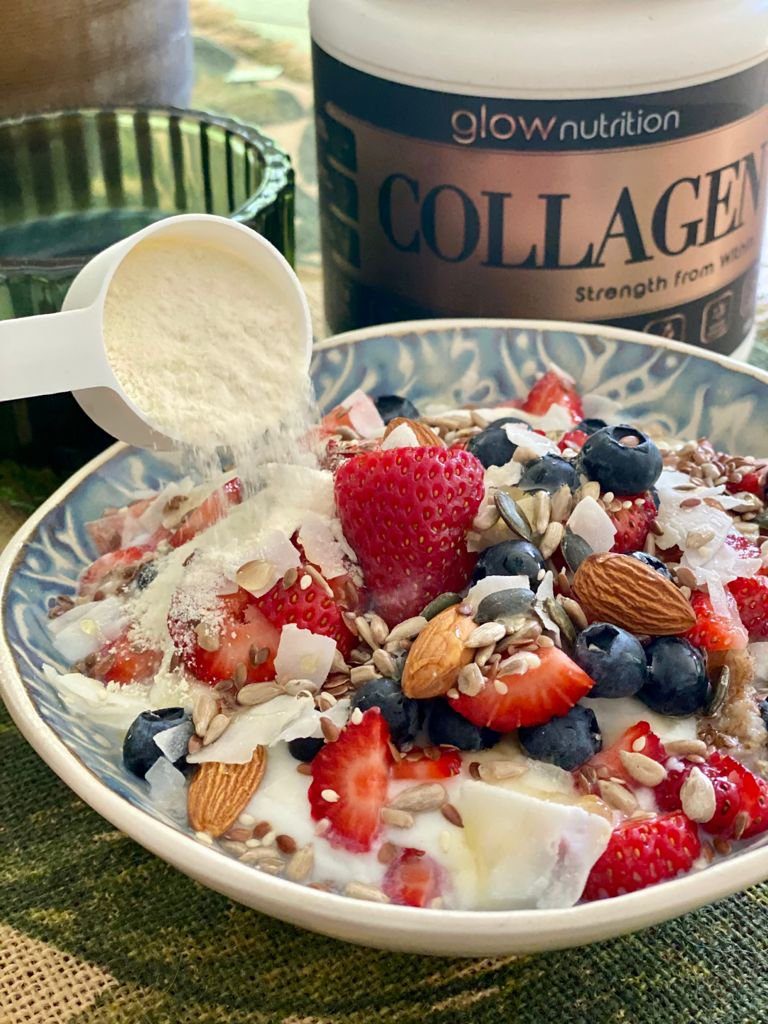ABOUT COLLAGEN
Collagen is the most abundant protein found in your body, it constitutes 30% of the total protein largely found in your skin and 90% of the total protein found in your bones, which is really why it plays such a significant role in skin and bone health.
The name collagen comes from the Greek word “kólla” which translated means glue, so essentially collagen is the glue that keeps everything in your body together and is largely responsible for healthy joints and skin elasticity, as well as providing structure to our hair, skin and nails to keep us looking and feeling strong and healthy, because healthy aging is privilege.


NEW YOU
AGING & COLLAGEN
Our body naturally produces collagen whilst we are growing and our bone structure and muscles are developing. Collagen production begins to peak at around the age of 20 and slowly our bodies begin to lose between 1% and 2% collagen each year from our mid 20’s. By the time you reach the age of 60, you may have already lost between 35% and 60% of collagen in your body. Early signs of declining collagen are often experienced in painful joints and muscles, reduced mobility, and you begin to see the first signs of fine lines and wrinkles appearing. Characteristics of aging skin:
HELPING YOU EVERYDAY
Menopause and Collagen
Menopause is the natural process in which a woman’s body stops producing eggs and her menstrual cycle ends. It typically occurs between the ages of 45 and 55, and is marked by a decrease in the production of the hormones oestrogen and progesterone. Common symptoms of menopause may include hot flashes, night sweats and mood swings. Treatment options include hormone replacement therapy, lifestyle changes, and alternative therapies.
Taking daily Collagen as a natural substance can assist with:
Improved Skin Health: Collagen helps to keep skin looking youthful and hydrated, which can be especially beneficial during menopause when skin can become dry and wrinkled.
Reduced Joint Pain: Collagen can help to reduce joint pain and stiffness, which can be a common symptom of menopause.
Improved Bone Health: Collagen can help to strengthen bones and reduce the risk of osteoporosis, which is a common concern for women during menopause.
Improved Digestive Health: Collagen can help to improve digestion and reduce symptoms of irritable bowel syndrome, which can be a common symptom of menopause.




INCREASING YOUR HEALTH
Stress and Collagen
Stress can have a negative effect on collagen production. When the body is under stress, it produces the hormone cortisol, which can interfere with the production of collagen. Cortisol can also break down existing collagen, leading to wrinkles and other signs of aging. Collagen has been found to help reduce stress levels by helping to regulate the body’s hormones, which can help to reduce anxiety and depression.
Additionally, stress can lead to poor lifestyle choices, such as smoking and drinking, which can further damage collagen. There’s a new way to help find balance and reduce your cortisol levels – collagen! Collagen has been found to help improve overall well-being. It is loaded with amino acids that help fight stress and support the body’s natural healing processes.
Collagen can help to improve sleep quality, which can also help to reduce stress. Keep your body and mind healthy with collagen! Eating whole foods, reducing caffeine and alcohol, getting regular exercise and taking Collagen daily can assist your body manage stress in a natural way.
HELPING YOU EVERYDAY
Immunity and Collagen
Did you know that collagen can actually have a positive impact on your immune system? Research¹ has shown that collagen helps the body produce antibodies.
Quality hydrolised collagen holds the key to improving your health and wellbeing. Not only does collagen support skin, hair and nail health, it also helps your body produce antibodies to fight against the common cold and other illnesses.
Collagen can help to protect the gut lining, which is connected to our overall immunity.
Get the support your body needs to stay healthy – add collagen to your daily routine and give your immune system the boost it needs!
REFERENCE: https://www.ncbi.nlm.nih.gov/pmc/articles/PMC8620403/


